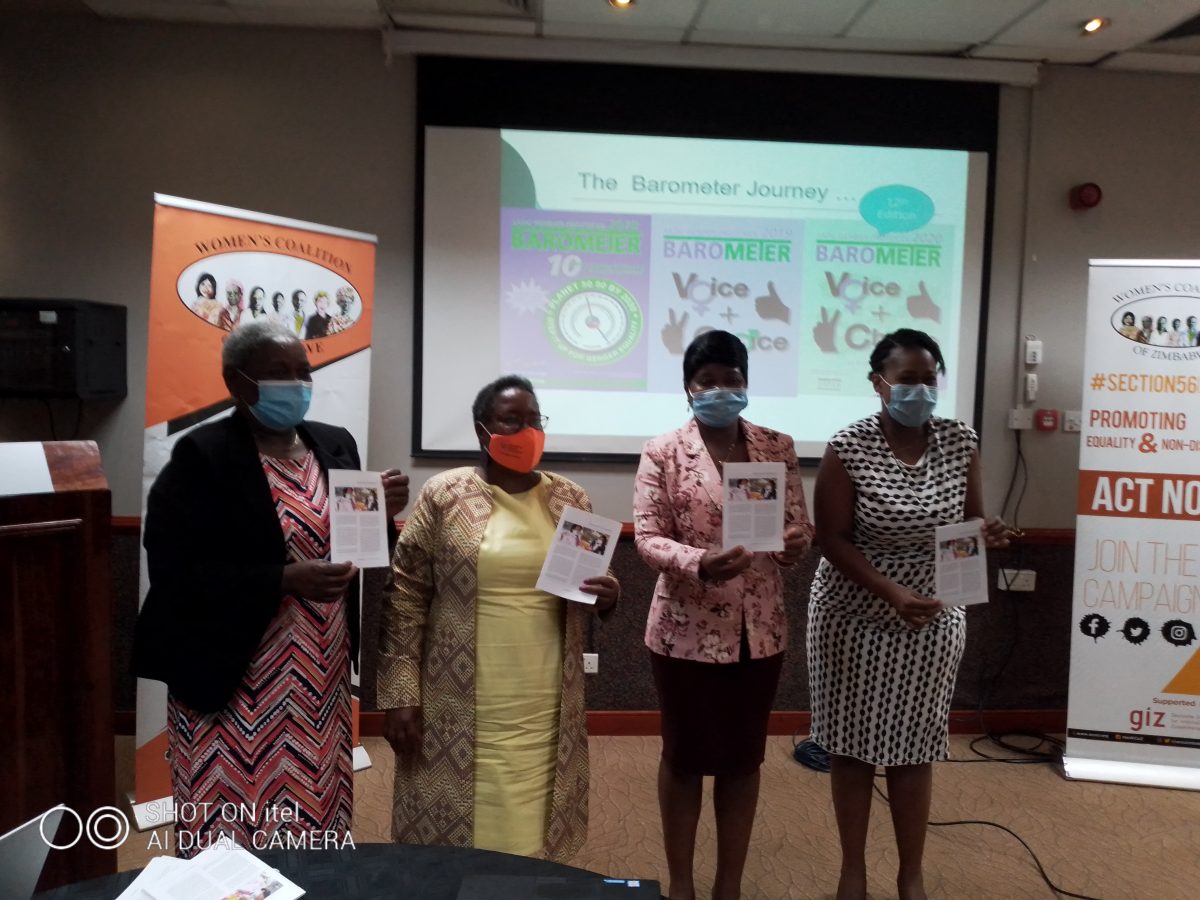The 12th #VoiceandChoice Barometer reflects slow progress in advancing women’s rights in the Southern African Development Community (SADC) region.
In her keynote address at the 12th #VoiceandChoice Barometer in Harare on 27 October 2020, Mrs. Virginia Muwanigwa, the Chief Executive Officer of the Zimbabwe Gender Commission called on stakeholders to continue working together in attaining positive outcomes for women’s rights.
“The 12th #VoiceandChoice Barometer reflects slow progress in advancing women’s rights in the Southern African Development Community (SADC) region. The COVID-19 pandemic presents an overt threat to the Sexual Reproductive Health and Rights (SRHR) gains made to date,” Mrs. Muwanigwa said.
The Barometer measures 100 indicators in seven thematic areas: sexual and reproductive health; adolescent SRHR; safe abortion; GBV; HIV and AIDS; harmful practices and sexual diversity. The 2020 Barometer adds chapters on Climate Change, Economic Justice and Women’s Political Participation which the Southern African Gender Protocol Alliance deal with.
The 2020 Barometer continues measuring progress against the 100 SRHR indicators. The SADC SRHR strategy adopted by Health Ministers in 2018 provides a progressive tool for measuring the progress of SRHR in the region. The strategy leverages global, continental, and regional frameworks to advance SRHR at the private and public levels. The indicators used to measure the status of SRHR in SADC include 12 out of the 20 indicators in the SADC SRHR Scorecard that governments will be reporting against.
Mrs Muwanigwa said the Zimbabwe Gender Commission has included activities to ensure SRHR issues are on the national agenda.
“In our COVID-19 monitoring, we noted that gender dimensions included reduced protection for women’s SRHR and also increased GBV.
“We applaud the Health Cluster of the Women’s Coalition for their role in developing a best practice/ model of addressing the negative patriarchy- based social norms that perpetuate inequalities in SRHR. Issues we are discussing here today resonate and compliment efforts by ZGC to ensure the achievement of Gender Equality in Zimbabwe through addressing underlying and systematic barriers to the achievement of social agency by women and girls, particularly over their bodies.”
Speaking at the same occasion, Priscilla Maposa, the GenderLinks Manager for Zimbabwe alluded to her organisation’s Sunrise Campaign that seeks to empower women with entrepreneurial skills as a way of advancing their economic rights.
“The Sunrise Campaign seeks to ensure that women become economically empowered. We work mainly with local authorities since they are better placed to provide basic services for survivors of gender-based violence. We work with 92 local authorities in the country and encourage them to mainstream gender-sensitive policies in their work,” Maposa said.
Muchanyara Mukamuri with the Young Women Christian Association bemoaned the rise in maternal and neonatal deaths, especially during this time of COVID-19.
Mrs. Muwanigwa added that patriarchy-based socio-cultural norms and practices are a hindrance to the enjoyment of women’s human rights and are the major underlying factor to gender inequality.
“Social norms shape our gender identities, consequently resulting in gender inequality. They are entrenched and consistently re-enforced by communities and institutions including family, education, media, and other institutions through the process of socialisation. The wider gaps of gender disparities and inequalities in all spheres of life are no doubt a result of negative socio-cultural norms and patriarchal practices perpetuated by socialisation,” she said.
Findings by the Zimbabwe Gender Commission on the underlying issues to SRHR among others revealed the negative influence of socio-cultural norms and practices on women’s aspirations, particularly in higher and tertiary institutions.
The negative social-cultural norms and practices are also often portrayed in the media resulting in negative impressions of women. The media plays a huge role in the sexualization of women, a misconception perpetuated by the patriarchy that women are of low morals and easily give in to sexual demands. Violence against women is also perpetrated to deter women from seeking actualization if they are seen to be deviating from the so-called `values`, `norms` and stereotypical roles,” she added.
The meting was attended by representatives from the Southern Africa Gender Protocol Alliance, the Women’s Coalition of Zimbabwe, the media and Gender Links among others with support from Amplify Change, Diakonia and the New Venture Fund.






